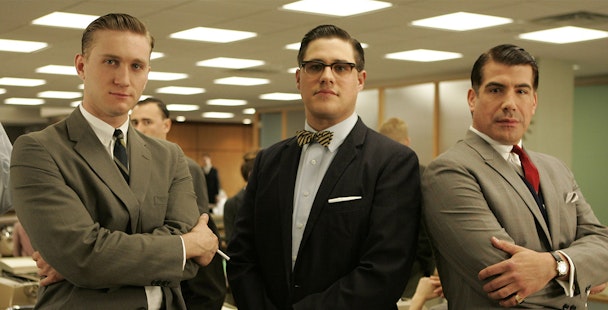Would a return to the media commission system of yore create better ads?
I belong to a tribe called the Wheni.

Harry Crane worked differently to today's media men
When I was a lad…
When I was at Ogilvy…
The thing about us Wheni is we tend to piss off younger people, although we don’t mean to. (Ravi Amaratunga Hitchcock please take note).
So I fear I’m at risk of irritating many more younger people in this short piece. But what the hell, here goes anyway.
I was asked a question by a young creative director.
“Go on, tell me the truth,” he said. “Was it better in the old days?”
The answer is yes – and no.
I started in advertising exactly 40 years ago last Tuesday. I was taken on as a trainee copywriter at Ogilvy Benson & Mather, and that’s the first thing that was better about the old days: I didn’t have to spend a year putting a ‘book’ together.
I didn’t have to put up with middle-ranking creative being ironic as they leafed through my work, I didn’t have to sign off to get just fifty quid a week for working my nuts off, and I didn’t have to live in squats or doss on floors while trudging from agency to agency hoping for a placement.
I just did a copy test – like a GCSE English exam, really.
Write a short autobiography, explain a guitar to a Martian, describe a delicious dish, that sort of thing.
On the strength of a few lines about a chicken on a raft (egg on toast), I got hired on the princely salary of £1,500 a year. Even then it was slim pickings.
Six of us started on the same day, and six equally green art directors started a few weeks later.
The point I’m making rather slowly is that the agency had money – enough to finance a creative crèche. JWT, McCann and a couple of others could all afford to carry passengers. They were comfortably profitable businesses thanks to the commission system.
Clients didn’t pay their agencies - they paid the media owners. One sum of money accounted for both the space they bought and the content that filled it. Hence the term ‘above the line’. The media owners then paid up to 17.65% back to the agencies as a thank you for the work.
This rewarded good ads, because good ads ran more frequently for a longer period, making easy money for the agency.
Crucially, that money bought time.
Ah yes, that is something that was so much better about ye goode olde dayes – no timesheets. More money meant more time to work on ideas – two weeks for an ad, a month for a campaign.
David Kolbusz of Droga5 recently wrote that he had been given two whole weeks to work on one job.
Had he spent those weeks bent over a layout pad or a Mac? Nope. He walked, went to an exhibition, mucked around. But all the while, his brain would have been filtering the problem.
He didn’t reveal what he’d came up with, but my bet is a great mind like his – given time – will almost always come up with something interesting.
That’s why it was better when I was a lad.
More money meant more time meant better work.
Ah, those were the days. Creative people had the magic dust. David Abbott, Paul Arden, Jeremy Sinclair, Dave Trott and the rest all helped add millions to the bottom line profits of their clients’ companies. John Webster turned Walkers, a small Leicester crisp business, into the most valuable grocery brand in the UK.
And today? Well, the data gurus are the peeps in Porches now.
But I don’t pine for the past – not at all. Though some things were better in them thar days, being right here, right now in advertising is completely, totally brilliant.
That’s what I’ll write about next time: how much I envy these new tribes of hackers, makers and do-ers.
They are changing the world in ways my lot simply couldn’t.

